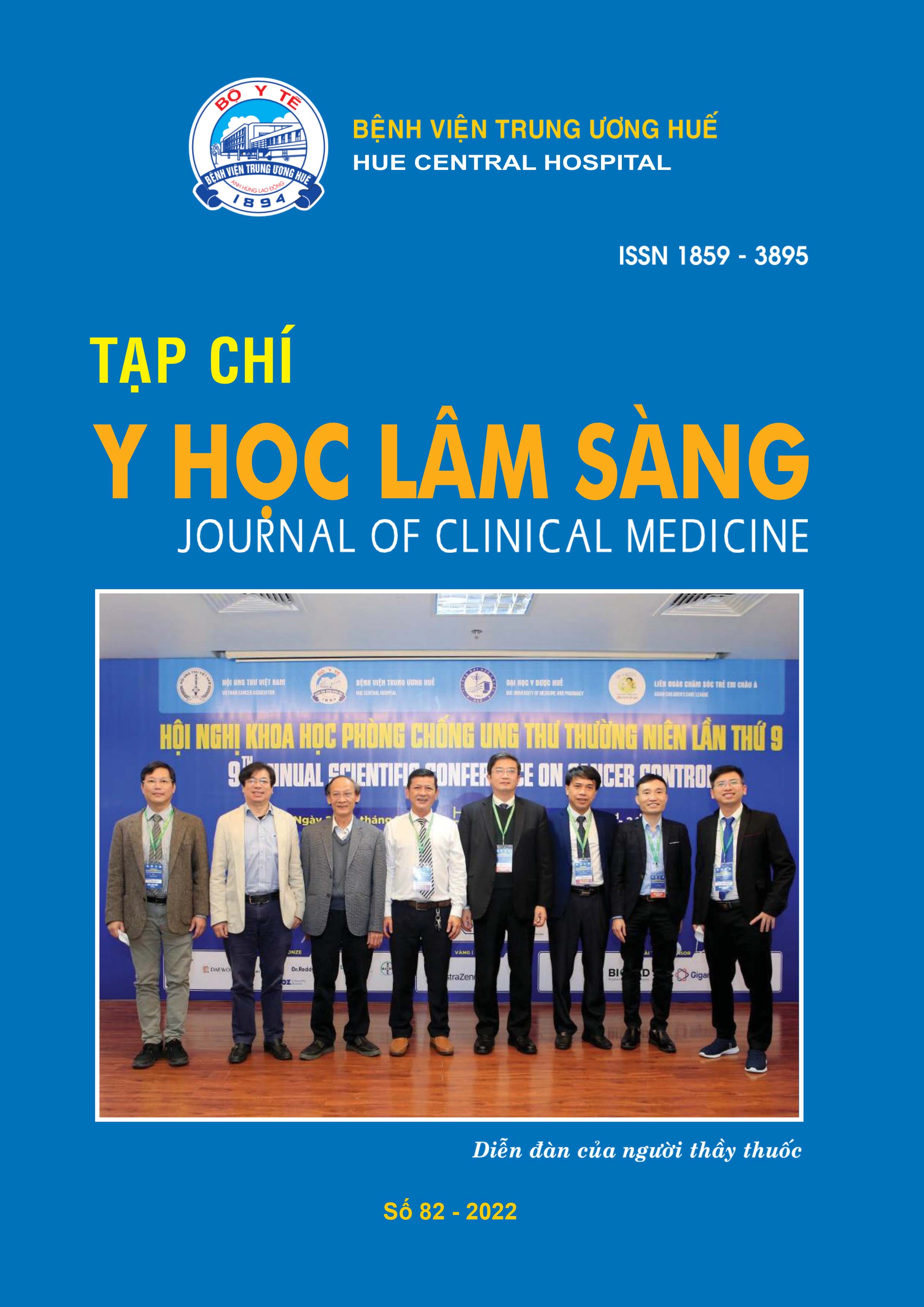Tóm tắt
Mở đầu: Theo Globocan 2020, ung thư vú chiếm tỷ lệ cao nhất 24,5% trong các loại ung thư ở phụ nữ trên toàn thế giới và chiếm 25,8% tại Việt Nam. Trong những bệnh nhân ung thư vú, có khoảng 60 - 70% bệnh nhân có thụ thể nội tiết estrogen (ER) dương tính, trong đó có 65% thụ thể progesterone (PR) dương tính. Những bệnh nhân có thụ thể nội tiết ER dương tính được điều trị liệu pháp nội tiết có tỷ lệ sống sót cao hơn so với những bệnh nhân có thụ thể nội tiết ER âm tính. Vì vậy, liệu pháp nội tiết tác động vào hoạt động Estrogen đã trở thành nền tảng trong điều trị ung thư vú trong hơn một thế kỷ qua.
Đối tượng và phương pháp: Nghiên cữu thuần tập hồi cứu, tương quan 142 đối tượng ung thư vú tại Trung tâm ung bướu - Bệnh viện Trung ương Huế trong khoảng thời gian từ 01/01/2018 đến ngày 01/06/2022. Điều kiện chọn mẫu là những đối tượng được chẩn đoán xác định ung thư vú giai đoạn không di căn xa và chưa điều trị liệu pháp nội tiết trước đó. Dữ liệu được thu nhập bằng bảng câu hỏi, tham khảo thông tin hồ sơ bệnh án. Nhập số liệu và phân tích thống kê thực hiện trên phần mềm SPSS 16.0 và Excel 2016.
Kết quả: Độ tuổi trung bình tại thời điểm chẩn đoán ung thư vú là 49 ± 1,14, giai đoạn I - II chiếm 71,2%. Về đặc điểm phân tử, tỷ lệ ER (+) chiếm 124/142 (87,3%), PR (+) 115/142 (81%), Her - 2 (+) 37/142 (26,2%), Ki 67 ≥ 15% 54/121 (44,6%). Về hiệu quả điều trị, DFS 42,41 ± 0,94 tháng và OS 46,71 ± 0,46 tháng, tỷ lệ OS 4 năm 93,7%. Các yếu tố nguy cơ làm giảm DFS và/hoặc OS như N (+), Ki 67 ≥ 20%, 1 thụ thể nội tiết (+). 53,6% bệnh nhân có tác dụng phụ khi điều trị liệu pháp nội tiết, tuy nhiên hầu hết là độ 1 - 2 và không ghi nhận bất kỳ trường hợp nào tử vong liên quan đến tác dụng phụ của liệu pháp nội tiết.
Kết luận: Đặc điểm về thể phân tử ung thư vú có tiên lượng xấu hơn với các nghiên cứu khác như tỷ lệ 2 thụ thể (+) thấp, chỉ số Ki 67 cao và tỷ lệ Her - 2 (+) cao. Tỷ lệ sống còn toàn bộ 4 năm chiếm gần 94% và liệu pháp nội tiết an toàn cho bệnh nhân.
Tài liệu tham khảo
Allred DC, Carlson RW, Berry DA, et al. NCCN Task Force Report: estrogen receptor and progesterone receptor testing in breast cancer by immunohistochemistry. J Natl Compr Canc Netw. 2009;7(suppl 6):S1–S21.
RussoJ, Russo JH, Steroid J. The role of estrogen in the initiation of breast cancer. Biochem Mol Biol. 2006;102(1- 5):89-96.
Beatson GT, On the Treatment of Inoperable Cases of Carcinoma of the Mamma: Suggestions for a New Method of Treatment, With Illustrative Cases.1. Lancet, 2019;148(3802):104-107.
C. F. Dunne. Hormonal therapy for breast cancer. Cancer Nursing, vol. 11, no. 5, 1988. Chap92. pp. 288-294.
Adam C, Beth DE. Clinical Trial Endpoints for the Approval of Cancer Drugs and Biologics Guidance for Industry. U.S. Food and Drug Administration. 2018:1-16.
Trieu PD, Mello - Thoms C, Brennan PC. Female breast cancer in Vietnam: a comparison across Asian specific regions. Cancer Biology and Medicine. 2015;12(3):238-245.
Bae SY. Poor prognosis of single hormone receptorpositive breast cancer.BMC Cancer, 2015;15:138.
Moffat FL, Harris JR, Lippman ME, Morrow M, Osborne CK, Lippincott Williams & Wilkins. Clinical and pathologic prognostic and predictive factors, in Diseases of the Breast, 5th edition, 2014. Chapter 28.
Tonellotto F et al. Impact of Number of Positive Lymph Nodes and Lymph Node Ratio on Survival of Women with Node - Positive Breast Cancer. Eur J Breast Health. 2019; 15(2): 76-84.
Ethier JL et al . Outcomes of single versus double hormone receptorepositive breast cancer. A GEICAM/9906 substudy. European Journal of Cancer. 2018;94:199-205.
Carroll J et al. Solving-a-breast-cancer-mystery-why-do- double-positive-women-do-better. News. cancerresearch UK. 2015.
Cella D, Fallowfield LJ. Recognition and management of treatment-related side effects for breast cancer patients receiving adjuvant endocrine therapy. Breast Cancer Research and Treatment. 2008;107(2):167-180.
| Đã xuất bản | 25-07-2022 | |
| Toàn văn |
|
|
| Ngôn ngữ |
|
|
| Số tạp chí | Số 82 (2022) | |
| Phân mục | Nghiên cứu | |
| DOI | 10.38103/jcmhch.82.14 | |
| Từ khóa | Ung thư vú, liệu pháp nội tiết, thời gian sống không bệnh, thời gian sống toàn bộ, dụng phụ điều trị nội tiết Breast cancer, hormone therapy, disease free survival, overall survival, side effects |

công trình này được cấp phép theo Creative Commons Attribution-phi thương mại-NoDerivatives 4.0 License International .
Bản quyền (c) 2025 Tạp chí Y học lâm sàng Bệnh viện Trung Ương Huế

